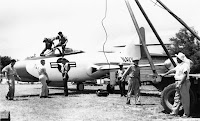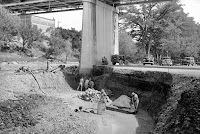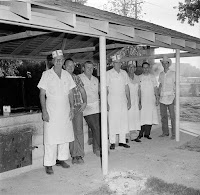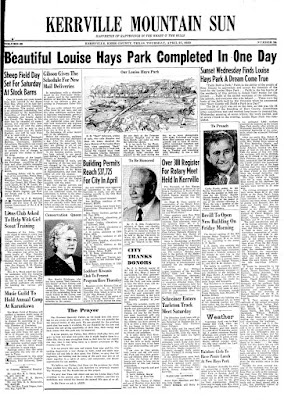 |
Louise Hays Park, not long after its single-day construction, on April 26, 1950.
Note the pontoon bridge in the background.
Click on any image to enlarge |
My son Joe and I walk through Louise Hays Park several times a week, and this week I was reminded how much it's changed since it was built in a single day, back on April 26, 1950.
 |
Louise Hays,
Robert Hays,
and Mayor Bullard |
Robert S. Hayes, an oilman from San Antonio took possession of a 2800 acre ranch south of the city on October 1, 1949. He offered to donate 35 acres to the city on a public (and a private) condition. The public condition: the park would be named for his young wife, Louise. The private condition: the park had to be built in a day. A family member told me that he wanted the park built in a day because he was worried the sleepy little town napping in the bend of the Guadalupe River would put off finishing the park, and it would never get done.
The community took the challenge.
 |
| The big day |
Jack Peterson chaired the committee that built the park. J. O. McKnight was the landscape architect that designed the park, which featured drives, a grand arched entryway, picnic tables, a pontoon bridge, playground equipment, and a big, big slab -- for dances. The committee labored under the constant constraint: it had to be built in a day. The roadways would be a challenge. The archway, another. The big slab, yet another. The plan brought in estimates of $20,000. Subcommittees raised donations from businesses and individuals, and area stockmen were asked to contribute livestock for a big auction. The grocery stores sent food for the lunches. Bakeries sent doughnuts and bread. Schreiner College sent some engineering students under the careful supervision of Harry Crate. The principal at Tivy High School came with some young volunteers. Contributions came from the entire county -- not just the city residents.
 |
| The pontoon bridge |
After months of planning, April 26, 1950, the Big Day, dawned slowly over Tivy Mountain. At 7 o'clock that morning work began, to the sounds of horns, whistles, bells, and sirens. The Rev. Walter Kerr, pastor of the First Methodist Church, and chair of the ministerial alliance, asked a blessing on the crew. The lovely Ms. Louise Hays turned the first spade of dirt. Then an estimated 2,000 workers began their history-making project.
When the sun set over the western hills beyond Ingram and Hunt, Kerrville had built a park.
Kerrville had also made news. "New Park? It's All in a Day's Work." reported the Dallas News. "$1,000,000 Kerr Park Built in Day," said the Star-Telegram. The San Angelo Standard told its readers "Just Like They Said, 'We'll Build a Park in a Day.'"
 |
| The missing millstone |
In its first few years, the park had many features which might surprise visitors today.
On the hillside below the metal pavilion and above the current covered stage there was once a miniature golf course. I'm old enough to remember the course, set into the steep hillside.
I do not remember the pontoon bridge, but I have several photographs of the structure. I imagine it did not last long after the first flood. From the photos, I think the pontoon bridge was about where today's river dam now stands.
Also missing from the park: a table made from the millstone from Kerrville's Dietert Mill. The old mill site is still here, though in horrible shape. The millstone was reported missing in 1971, and a reward was offered for its return.
 |
| Navy F9F-5 Panther at park |
Apparently the park once had a Navy jet on display, also near the playground area. It was a F9F-5 Panther, and it was placed at the park in 1959. I'm not sure when it left.
 |
| The Ave-Cot Thrill Show |
Elsewhere I have written about the water ski shows produced by Cotton and Ava Eldridge, the Ave-Cot Water Thrill Show, which were extremely popular in the late 1950s. The shows included stunt water skiing, jumps, and even a water skiing dog, and were produced in that little body of water at the park.
 |
| Deep swimming pool at park |
And there was once a deep swimming hole, just upstream from the Sidney Baker Street bridge, complete with a diving board. That, too, was a victim of a flood, and filled with rocks and debris from upstream.
 |
| Community picnics |
There were once long picnic tables and a barbecue pit at the park, up on the high ground. I remember attending many events there, mostly fundraisers produced by local service clubs. The food was good, and it was fun eating with so many folks from the community.
 |
| Cooks at park BBQ pit |
Today's improvements are nice, too, and I enjoy visiting the park. It's a real asset for downtown Kerrville. No one knows what the park might look like in fifty years, but I bet it will continue to be a great draw for visitors to Kerrville.
Until next week, all the best.
Joe Herring Jr. is a Kerrville native who has spent many happy hours at Louise Hays Park, both as a child, and with his own children. This column originally appeared in the Kerrville Daily Times April 7, 2018














THANK YOU JOE FOR THE HISTORY. I MOV3D HERE IN 1974 SO HAVE SEEN A FEW CHANGES. HAVE ALWAYS LOVED THE PARK.
ReplyDeleteInteresting read. The newspaper was indeed welcome. Many thanks for the posting. Rob Kozub.
ReplyDelete